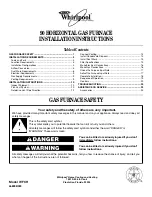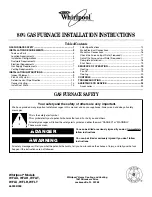
40
OPTIONAL VENTING BELOW THE FURNACE
The venting system may be positioned below the furnace
ONLY
IF the factory accessory External Vent Trap Kit is used.
The External Vent Trap Kit is only approved for PVC/ABS
DWV venting systems.
CAREFULLY
FOLLOW
THE
INSTRUCTIONS
PROVIDED WITH THE EXTERNAL VENT TRAP KIT
FOR LAYING OUT THE VENTING SYSTEM AND
THE DRAIN SYSTEM.
The instructions included with this
furnace
DO NOT APPLY
to vent systems that are located
below the furnace.
NOTICE
CARBON MONOXIDE POISONING HAZARD
Failure to follow the instructions outlined below for each
appliance being placed into operation could result in carbon
monoxide poisoning or death.
The instructions included with this furnace
DO NOT APPLY
to vent systems that are located below the furnace.
CAREFULLY
FOLLOW
THE
INSTRUCTIONS
PROVIDED WITH THE EXTERNAL VENT TRAP KIT
FOR LAYING OUT THE VENTING SYSTEM AND
THE DRAIN SYSTEM
when all or part of the venting
system is placed below the furnace.
Proper configuration of the venting and drain system is critical
when placing all or part of the venting system below the level
of the furnace.
VENT GASSES COULD BE RELEASED
FROM THE DRAINAGE SYSTEM
if the instructions
provided with the External Vent Trap Kit are not followed.
!
WARNING
Locating the Vent Termination
General
NOTE
:
Termination Requirements for the Provinces of
Alberta and Saskatchewan are located at the end of this
section.
Combustion--air inlet pipe (direct vent/2--pipe system only) and
vent pipe must terminate outside structure, either through sidewall
or roof.
Special termination requirements may be required in other
Canadian provinces. Refer to the authority having jurisdiction for
clarification and/or additional clearance requirements.
For vent termination clearance, references to National codes are shown
in Fig. 51 for Direct Vent/2--Pipe system and Fig. 52 for Ventilated
Combustion Air/Non--direct Vent/1--Pipe system. For exterior
termination arrangements, refer to Fig. 53 for Direct Vent/2--Pipe
system and Fig. 54 for Ventilated Combustion Air/Non--Direct/1--Pipe
system. Contact Local code authorities for other requirements to
and/or exemptions from the National codes shown in the figures.
Roof termination is often preferred since it is less susceptible to
damage or contamination, is usually located away from adjacent
structures, is less prone to icing conditions, and and it often has less
visible vent vapors. Sidewall terminations may require sealing or
shielding of building surfaces with a corrosive resistance material due
to the corrosive properties of combustion products from the vent
system, as well as protection of adjacent structures.
Roof termination is the recommended termination location. Roof
terminations provide better performance against sustained prevailing
winds. The roof location is preferred since the vent and combustion
air system is less susceptible to damage or contamination. The
termination is usually located away from adjacent structures or other
obstacles such as inside corners, windows, doors or other appliances. It
is less prone to icing conditions, and it often has less visible vent
vapors.
Sidewall terminations may require sealing or shielding of building
surfaces with a corrosive resistance material due to the corrosive
properties of combustion products from the vent system, as well as
protection of adjacent structures.
RECOMMENDED SUPPORT FOR
VENT TERMINATIONS
It is recommended that sidewall vent terminations in excess of
24 inches (0.6 M) or rooftop terminations in excess of 36
inches (1 M) in vertical length be supported by
EITHER
the
Direct Vent Termination Kit shown in Table 12 or by
field--supplied brackets or supports fastened to the structure.
NOTICE
When determining appropriate location for termination, consider
the following guidelines:
1. Comply with all clearance requirements stated in Fig. 51 or
Fig. 52 per application.
2. The vent termination must be located at least 3 feet from an
inside corner and follow the clearance distances in the In-
side Corner Termination drawing.
3. Termination or termination kit should be positioned where
vent vapors will not damage plants/shrubs, air conditioning
equipment or utility meters.
4. Do not locate termination directly into prevailing winds.
Termination should be positioned so that it will not be
affected by sustained prevailing winds over 30 mph, wind
eddy, such as inside building corners, or by recirculation of
flue gases, airborne leaves, or light snow.
5. Termination or termination kit should be positioned where it
will not be damaged by or subjected to foreign objects such
as stones, balls, etc.
6. Termination or termination kit should be positioned where
vent vapors are not objectionable
.
Direct Vent / 2-Pipe System
Direct vent (2--pipe) vent and combustion air pipes must terminate
outside the structure. See Fig. 51 For references to vent clearances
required by National code authorities.
Allowable vent and
combustion air terminations are shown in Fig. 53.
CARBON MONOXIDE POISONING HAZARD
Failure to follow the instructions outlined below for each
appliance being placed into operation could result in carbon
monoxide poisoning or death.
For all venting configurations for this appliance and other gas
appliances placed into operation for the structure, provisions
for adequate combustion, ventilation, and dilution air must be
provided in accordance with:
U.S.A. Installations
: Current edition of Section 9.3 NFPA
54/ANSI Z223.1 Air for Combustion and Ventilation and
applicable provisions of the local building codes.
Canadian Installations
: Current edition of Part 8 of
CAN/CSA--B149.1. Venting Systems and Air Supply for
Appliances and all authorities having jurisdiction.
!
WARNING
Ventilated Combustion Air
The vent pipe for a Ventilated Combustion Air System must
terminate outdoors. See Fig. 52 for references to vent clearances
















































